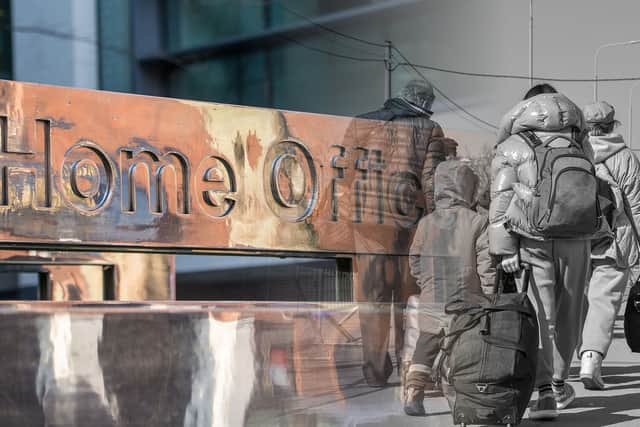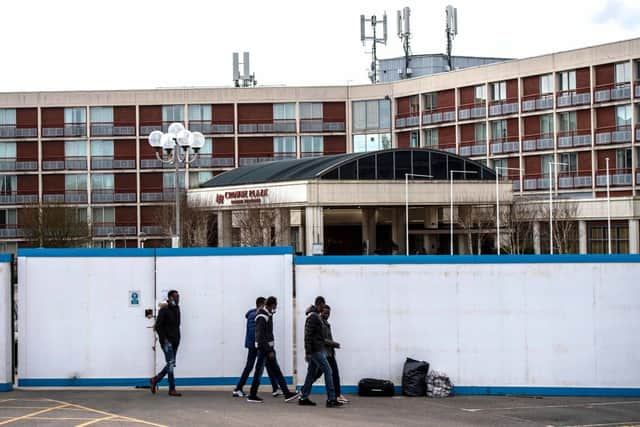UK immigration: Home Office plans to cut asylum seeker backlog ‘unfair’ and ‘unreasonable’
and live on Freeview channel 276
There are “serious flaws” in the Home Office’s plans to cut the asylum backlog, refugee charities have warned.
A document leaked to The Guardian has revealed plans to scrap official interviews with migrants hoping to claim asylum and instead replace them with an 11-page questionnaires that needs to be completed within a period of 20 working days. It comes as recently released government figures show that the number of claimants waiting for a decision on their application has surpassed 160,000.
Advertisement
Hide AdAdvertisement
Hide AdThe questionnaire, which the Home Office will send to about 12,000 people from Afghanistan, Eritrea, Libya, Syria, and Yemen from Thursday (23 February), is supposed to speed up the process by which claims are considered - so that people are c removed from the UK or granted permission to stay. But legal experts and asylum charities have said while they “welcome any move to cut the backlog”, the proposed new process is both “unfair” and “unreasonable”.
Refugee Action has pointed out that the form - which contains more than 50 complicated questions - is only available in English, with the government advising migrants and refugees to use “online translation tools” to complete it. This means that “people are being asked questions that could undermine their asylum claim if not properly understood, and all without legal help,” the charity warned.
Others have highlighted that if applicants fail to return the document within 20 working days, this “may result in [their] asylum claim being withdrawn.” The strict deadline has dismayed some legal experts, who told The Guardian it places “unreasonable” demands on already vulnerable people, particularly when they will not be able to seek legal advice within the time period.


One example of the questions asked in the document is: “If you do fear officials in your country, is it possible to email or telephone family members or friends in your country of origin to request [identity documents] without placing yourself or them at risk?”
Advertisement
Hide AdAdvertisement
Hide AdMeanwhile, another reads: “Were you subject to human trafficking (the recruitment, transportation, transfer, harbouring or receipt of people through force, fraud or deception, with the aim of exploiting them for profit) or modern slavery (severe exploitation of other people for personal or commercial gain) during your journey to or after you arrived in the UK?”
Responding to the plans, Caitlin Boswell, policy and campaigns manager at the Joint Council for the Welfare of Immigrants (JCWI), said: “People fleeing desperate circumstances need this government to make quicker and fairer asylum decisions, but this latest move is clumsy, unthinking, and could put people’s safety at risk. No one’s right to refuge should be jeopardised because they weren’t able to fill in an unwieldy form in a language they don’t speak.”
Enver Solomon, CEO of Refugee Council, added: “Moves to reduce the backlog are welcome but the answer is not yet more bureaucratic hurdles and threats of applications being withdrawn. Quickly granting refugee status to people from countries with high grant rates should be a welcome first step but the process must be well thought-out.
“After living in worry and uncertainty for months and even years without hearing anything about their claims, it cannot then be fair or reasonable to expect people to complete a lengthy form only in English in a matter of weeks - especially for those who don’t have access to legal advice and don’t speak English.”


Advertisement
Hide AdAdvertisement
Hide AdThe charity has also offered an example of the type of situation asylum seekers may now be placed in: “Let’s say you are an Afghan, who arrived in 2021 after the fall of Kabul. You have been waiting for nearly 18 months for a decision, haven’t heard from the Home Office for months about your case.
“Then, you get a letter and application form that you don’t understand. You don’t have a lawyer as legal aid has been dramatically cut, and you also don’t speak much English. What are you supposed to do? The risk is you will not be able to complete the form and your application will be withdrawn, meaning you will lose all financial support and accommodation. You would then have no choice but to disappear off the radar into the dangers of the illegal underworld.”
Meanwhile, Wilson Solicitors told NationalWorld: “Broadly, we welcome this plan if it means 12,000 asylum seekers will get a decision more quickly. But we query if there is sufficient support out there for all 12,000 asylum seekers to complete the questionnaires - particularly in English.”
The opposing view: claims of an 'asylum amnesty'
The government is also receiving criticism from those with a contrasting point of view - namely, that the new system will result in too many claims being granted. The Daily Mail for instance reported that more than 95% of the 12,000 claims are expected to be granted if the Home Office moves forward with the questionnaire.
Advertisement
Hide AdAdvertisement
Hide AdA source told the newspaper: “This is an asylum amnesty in all but name. One major issue here is that it will encourage people from these nationalities who are not yet in the UK to come here and attempt to get asylum. It will also push up immigration figures because once these 12,000 have been granted refugee status, they’ll be able to bring relatives here through the family reunion scheme.”
Officials however have refuted these comments, saying the new scheme will not give “blanket” refugee status by nationality. Instead, each case will be considered “on its own merits”. A Home Office source added that usual security and criminal checks will still be conducted and biometrics taken, but, for the first time, there will be no face-to-face interviews.
It is also worth noting that the five countries which will receive the questionnaire - Afghanistan, Eritrea, Libya, Syria, and Yemen - have been chosen because they have “high grant rates”. In other words, 95% of applicants are already being deemed suitable to be granted asylum.
The migration crisis has been a key topic of focus in recent months, as figures show that more than 160,000 people are awaiting a response to their claim - more than three times the number of pending cases seen at the end of 2019. There have also been problems with asylum seeking children going missing from Home Office hotels, with experts warning that they are likely being trafficked into gangs, and earlier this month, ‘protests’ outside an asylum seeker hotel in Knowsley turned violent.
Advertisement
Hide AdAdvertisement
Hide AdMerseyside Police condemned the “unacceptable” scenes, which saw a mob chanting “get them out” and a police van torched. Clare Moseley, founder of refugee charity Care4Calais, was among those from pro-migrant groups who went to the scene to show support for refugees. She told PA Media at the time: “I’m trying to get in touch with some of the poor men in that hotel. I can only imagine how frightened they are. It was like a war zone.”


Home Secretary Suella Braverman was criticised on Wednesday (22 February) after she claimed that housing asylum seekers in hotels had caused “understandable” tensions.
She told GB News: “It’s clear that we have an unsustainable situation in towns and cities whereby, because of the overwhelming numbers of people arriving here illegally and our legal duties to accommodate them, we are now having to house them in hotels. And that is causing understandable tensions within communities, pressures on local resources, and is frankly unsustainable.”
The Fareham MP has frequently come under fire for the rhetoric she uses to describe migrants - particularly after she told MPs in November that the South Coast was facing an “invasion” of illegal migrants.
Advertisement
Hide AdAdvertisement
Hide AdThe Home Office has said it intends to double the number of asylum caseworkers this year to help deal with record numbers waiting for a ruling on their request for sanctuary in the UK. This came after Prime Minister Rishi Sunak pledged in December to halve the number of people who had been waiting longer than six months for an initial decision on their application. More than 92,000 people have been identified as being in that group.
Comment Guidelines
National World encourages reader discussion on our stories. User feedback, insights and back-and-forth exchanges add a rich layer of context to reporting. Please review our Community Guidelines before commenting.
